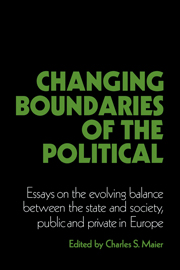 Changing Boundaries of the Political
Changing Boundaries of the Political Book contents
- Frontmatter
- Contents
- List of contributors
- Acknowledgments
- Introduction
- Part I Re-forming the political
- Part II Changing boundaries of political activity
- 5 Long waves in the development of welfare systems
- 6 Family, women, and the state: notes toward a typology of family roles and public intervention
- 7 Health care and the boundaries of politics
- 8 The politics of Wissenschaftspolitik in Weimar Germany: a prelude to the dilemmas of twentieth-century science policy
- 9 The survival of the state in European international relations
- Part III Uncertain boundaries for political economy
- Index
7 - Health care and the boundaries of politics
Published online by Cambridge University Press: 05 June 2012
- Frontmatter
- Contents
- List of contributors
- Acknowledgments
- Introduction
- Part I Re-forming the political
- Part II Changing boundaries of political activity
- 5 Long waves in the development of welfare systems
- 6 Family, women, and the state: notes toward a typology of family roles and public intervention
- 7 Health care and the boundaries of politics
- 8 The politics of Wissenschaftspolitik in Weimar Germany: a prelude to the dilemmas of twentieth-century science policy
- 9 The survival of the state in European international relations
- Part III Uncertain boundaries for political economy
- Index
Summary
Politics has no clearly definable boundaries. Virtually any aspect of society is potentially an object of political interest, if only because of its possible symbolic uses. Terrorism, to take an extreme case, observes no boundaries to the political: Any person or object can become a target of exemplary violence through the complex transformations of the terrorist code. To the revolutionary terrorist, everything is political, and politics is everything. At some historical moments, even many petty details of ordinary life – items of clothing, phrases of speech – take on instantly understood political meaning. The sphere of the political expands particularly in periods of upheaval and change. Realities previously accepted as natural and objective facts become objects of political change. Matters formerly considered private and personal become political and public, and decisions once assumed to be technical matters for experts to resolve erupt into political controversy.
Yet this phenomenon – the “politicization” of elements of social life commonly believed to lie beyond politics – testifies that politics generally has an assumed sphere. The boundaries may be inexact and indistinct, but their location and the level of concern about respecting them are nonetheless a significant aspect of a political culture. Although the division of what is political from what is nonpolitical may be entirely conventional, it is a convention that helps to give order to a society by distinguishing how different domains of social life ought to be run.
- Type
- Chapter
- Information
- Changing Boundaries of the PoliticalEssays on the Evolving Balance between the State and Society, Public and Private in Europe, pp. 221 - 254Publisher: Cambridge University PressPrint publication year: 1987
- 20
- Cited by


